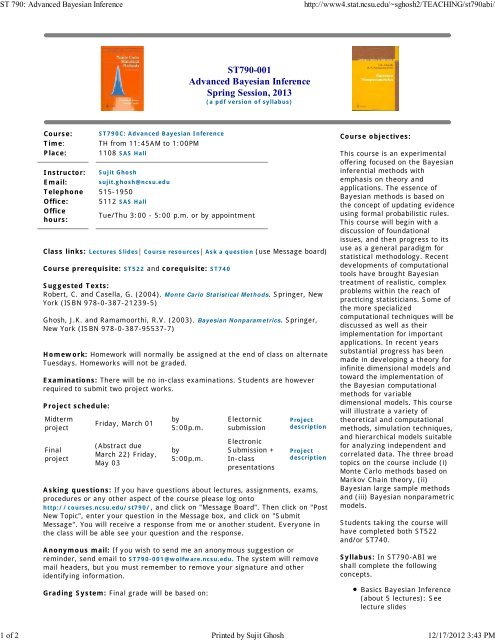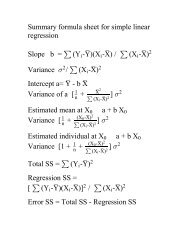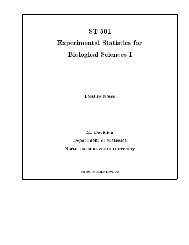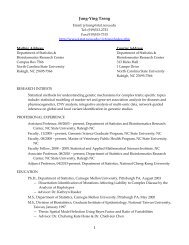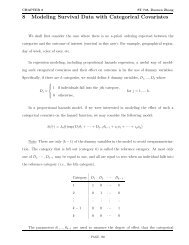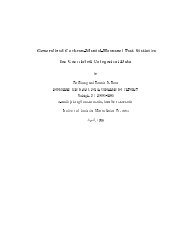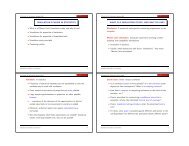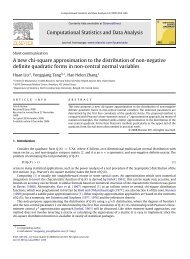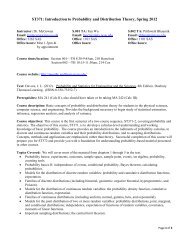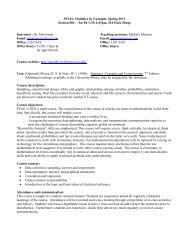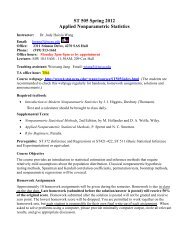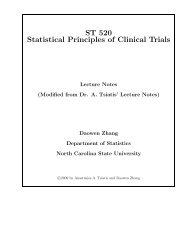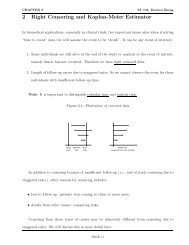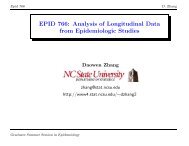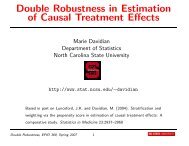a pdf version of syllabus - NCSU Statistics
a pdf version of syllabus - NCSU Statistics
a pdf version of syllabus - NCSU Statistics
Create successful ePaper yourself
Turn your PDF publications into a flip-book with our unique Google optimized e-Paper software.
ST 790: Advanced Bayesian Inference http://www4.stat.ncsu.edu/~sghosh2/TEACHING/st790abi/<br />
Course: ST790C: Advanced Bayesian Inference<br />
Time: TH from 11:45AM to 1:00PM<br />
Place: 1108 SAS Hall<br />
ST790-001<br />
Advanced Bayesian Inference<br />
Spring Session, 2013<br />
(a <strong>pdf</strong> <strong>version</strong> <strong>of</strong> <strong>syllabus</strong>)<br />
Instructor: Sujit Ghosh<br />
Email: sujit.ghosh@ncsu.edu<br />
Telephone 515-1950<br />
Office: 5112 SAS Hall<br />
Office<br />
hours:<br />
Tue/Thu 3:00 - 5:00 p.m. or by appointment<br />
Class links: Lectures Slides| Course resources| Ask a question (use Message board)<br />
Course prerequisite: ST522 and corequisite: ST740<br />
Suggested Texts:<br />
Robert, C. and Casella, G. (2004). Monte Carlo Statistical Methods. Springer, New<br />
York (ISBN 978-0-387-21239-5)<br />
Ghosh, J.K. and Ramamoorthi, R.V. (2003). Bayesian Nonparametrics. Springer,<br />
New York (ISBN 978-0-387-95537-7)<br />
Homework: Homework will normally be assigned at the end <strong>of</strong> class on alternate<br />
Tuesdays. Homeworks will not be graded.<br />
Examinations: There will be no in-class examinations. Students are however<br />
required to submit two project works.<br />
Project schedule:<br />
Midterm<br />
project<br />
Final<br />
project<br />
Friday, March 01<br />
(Abstract due<br />
March 22) Friday,<br />
May 03<br />
by<br />
5:00p.m.<br />
by<br />
5:00p.m.<br />
Electornic<br />
submission<br />
Electronic<br />
Submission +<br />
In-class<br />
presentations<br />
Project<br />
description<br />
Project<br />
description<br />
Asking questions: If you have questions about lectures, assignments, exams,<br />
procedures or any other aspect <strong>of</strong> the course please log onto<br />
http://courses.ncsu.edu/st790/, and click on "Message Board". Then click on "Post<br />
New Topic", enter your question in the Message box, and click on "Submit<br />
Message". You will receive a response from me or another student. Everyone in<br />
the class will be able see your question and the response.<br />
Anonymous mail: If you wish to send me an anonymous suggestion or<br />
reminder, send email to ST790-001@wolfware.ncsu.edu. The system will remove<br />
mail headers, but you must remember to remove your signature and other<br />
identifying information.<br />
Grading System: Final grade will be based on:<br />
Course objectives:<br />
This course is an experimental<br />
<strong>of</strong>fering focused on the Bayesian<br />
inferential methods with<br />
emphasis on theory and<br />
applications. The essence <strong>of</strong><br />
Bayesian methods is based on<br />
the concept <strong>of</strong> updating evidence<br />
using formal probabilistic rules.<br />
This course will begin with a<br />
discussion <strong>of</strong> foundational<br />
issues, and then progress to its<br />
use as a general paradigm for<br />
statistical methodology. Recent<br />
developments <strong>of</strong> computational<br />
tools have brought Bayesian<br />
treatment <strong>of</strong> realistic, complex<br />
problems within the reach <strong>of</strong><br />
practicing statisticians. Some <strong>of</strong><br />
the more specialized<br />
computational techniques will be<br />
discussed as well as their<br />
implementation for important<br />
applications. In recent years<br />
substantial progress has been<br />
made in developing a theory for<br />
infinite dimensional models and<br />
toward the implementation <strong>of</strong><br />
the Bayesian computational<br />
methods for variable<br />
dimensional models. This course<br />
will illustrate a variety <strong>of</strong><br />
theoretical and computational<br />
methods, simulation techniques,<br />
and hierarchical models suitable<br />
for analyzing independent and<br />
correlated data. The three broad<br />
topics on the course include (i)<br />
Monte Carlo methods based on<br />
Markov Chain theory, (ii)<br />
Bayesian large sample methods<br />
and (iii) Bayesian nonparametric<br />
models.<br />
Students taking the course will<br />
have completed both ST522<br />
and/or ST740.<br />
Syllabus: In ST790-ABI we<br />
shall complete the following<br />
concepts.<br />
Basics Bayesian Inference<br />
(about 5 lectures): See<br />
lecture slides<br />
1 <strong>of</strong> 2 Printed by Sujit Ghosh 12/17/2012 3:43 PM
ST 790: Advanced Bayesian Inference http://www4.stat.ncsu.edu/~sghosh2/TEACHING/st790abi/<br />
Final Semester Score = (CP + 4xMP + 5xFP)/10<br />
where CP is based on class participation and MP and FP are the scores (out <strong>of</strong><br />
100) on the midterm and the final projects, respectively. Grades will be assigned<br />
on the +/- scale.<br />
Auditing: Auditors are expected to attend class regularly and submit midterm on<br />
the same schedule as the other students. The final grade for auditors (AU or NR)<br />
will be based on their midterm scores. A midterm score <strong>of</strong> 75 or better is required<br />
for an AU.<br />
Policy on Academic Integrity: The University policy on academic integrity is<br />
spelled out in Code <strong>of</strong> Student Conduct. For a more though elaboration see the<br />
<strong>NCSU</strong> Office <strong>of</strong> Student Conduct website. For this course group work on homework<br />
is encouraged. However copying someone else's work and calling them your own<br />
is plagiarism, so the work you turn in should be your own.<br />
Students with Disabilities: Reasonable accommodations will be made for<br />
students with verifiable disabilities. In order to take advantage <strong>of</strong> available<br />
accommodations, students must register with Disability Services for Students<br />
(DSS), 1900 Student Health Center, CB# 7509, 515-7653.<br />
Reference material (Have requested these be on reserve at DH Hill<br />
Library):<br />
Carlin, B. P. and Louis, T. A. (2008). Bayesian Methods for Data Analysis (Third<br />
Edition), CRC Press, New York.<br />
Marin, J. M. and Robert, C. P. (2007). Bayesian Core: A practical Approach to<br />
Computational Bayesian <strong>Statistics</strong>, Springer, New York.<br />
Monte Carlo methods for<br />
Bayesian computation<br />
(about 10 lectures):<br />
Materials are primarily<br />
based on the following<br />
sections <strong>of</strong> the Robert &<br />
Casella's book titled<br />
"Monte Carlo Statistical<br />
Methods:"<br />
Chap.2: 2.1.2, 2.3,<br />
2.4<br />
Chap.3: 3.2, 3.3.1,<br />
3.3.2<br />
Chap.4: 4.1, 4.2, 4.3<br />
Chap.6: 6.2, 6.3.1,<br />
6.4.3, 6.5, 6.6, 6.7,<br />
6.9.3, 6.9.4<br />
Chap.7: 7.2, 7.3,<br />
7.4, 7.5<br />
Chap.8: 8.1, 8.2, 8.3<br />
Chap.9: 9.1.2, 9.2.2,<br />
9.2.3<br />
Chap.10: 10.1.1,<br />
10.1.2, 10.2.1,<br />
10.2.2<br />
Bayesian Large Sample<br />
Methods (about 3<br />
lectures): Materials are<br />
primarily based on the<br />
following sections <strong>of</strong> the<br />
Ghosh and Ramamoorthi's<br />
Book:<br />
Chap.1: 1.2.2, 1.3<br />
(excluding 1.3.3),<br />
1.4<br />
Bayesian Nonparametric<br />
Methods (about 10<br />
lectures): Materials will be<br />
primarily based on the<br />
following sections <strong>of</strong> an<br />
upcoming book by Ghoshal<br />
& van der Vaart:<br />
Chap.1: 1.1.2, 1.2<br />
Chap.2: 2.1, 2.2,<br />
2.3, 2.4.2, 2.4.4<br />
Chap.3: 3.1, 3.2,<br />
3.5, 3.6<br />
Chap.4: 4.1, 4.4,<br />
4.5, 4.6, 4.8.1, 4.9.2<br />
Last updated on: December 17, 2012<br />
2 <strong>of</strong> 2 Printed by Sujit Ghosh 12/17/2012 3:43 PM


